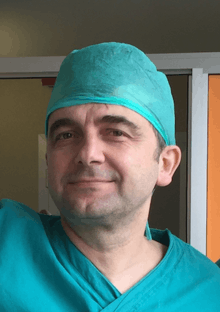Miroslav Djordjevic
| Miroslav L. Djordjevic | |
|---|---|
 | |
| Born |
Miroslav Đorđević 10 February 1965 Kruševac, Serbia |
| Nationality | Serbian |
| Education | 1984-1991, Belgrade University, School of Medicine |
| Occupation | surgeon specializing in GRS |
| Years active | 1992-Present |
| Children | 2 |
| Website | http://www.genitalsurgerybelgrade.com/index.php |
| Signature | |
 | |
Miroslav Djordjevic (Serbian spelling: Miroslav Đorđević) is a surgeon specializing in sex reassignment surgery and an Assistant Professor of Urology at the School of Medicine, University of Belgrade, Serbia.[1]
Early life and education
Djordjevic completed his medical studies, including his urology residency, at School of Medicine, University of Belgrade, Serbia in 1991. His PhD thesis, completed in 2003, was titled "A new approach for surgical treatment of Peyronie's disease".
Career
Djordjevic works in the field of genital reconstructive surgery, and is one of the few in the world to have encompassed treatment of all anomalies of the genital system regardless of gender or age. He is the founder and leader of the Belgrade Center for Genital Reconstructive Surgery.[2] His experience in sex reassignment surgery has resulted in new knowledge of the surgical anatomy of the male and female genitalia.
Djordjevic has published many papers on the surgical treatment of hypospadias, epispadias, Peyronie's disease, adult hypospadias, buried penis, urethral reconstruction, pediatric reconstructive urology, penile enhancement surgery as well as transsexual surgery.[1]
Since 1999, Djordjevic has been a Professor of Surgery, Medical School, at Belgrade University. Since 2013, he has been a member of the Academy of Serbian Medical Association.[1]
In 2008 Djordjevic jointly authored a study into 'Transsexualism in Serbia: A Twenty-Year Follow-Up Study'.[3]
Djordjevic has been invited to give lectures on genital reconstructive surgery and sexual medicine at various symposia and meetings around the world.
Serbia has become a centre for sex-change surgery,[4][5] in-part due to the work of Djordjevic, with candidates coming from France, Russia, Iran, India,[6] the United States, South Africa, Singapore and Australia.[7]
Djordjevic has said that some people regret having undergone the procedure and want to detransition. He says this is particularly so for transgender women over 30.[8][9]
See also
References
- 1 2 3 "Belgrade Center for Genital Reconstructive Surgery". genitalsurgerybelgrade.com. 2007–2016.
- ↑ "Dr. Miroslav Djordjevic MD". American Aesthetic Association. Retrieved 22 December 2017.
- ↑ "Transsexualism in Serbia: A Twenty-Year Follow-Up Study". 4 March 2008. doi:10.1111/j.1743-6109.2008.00799.x.
- ↑ "How a Homophobic Country Became a Go-To Spot for Gender Reassignment Surgery". broadly.vice.com. 5 January 2016.
- ↑ "Belgrade - the gender reassignment capital?". www.imtj.com. 29 April 2016.
- ↑ "18 Gujaratis undergo penile implant for erectile dysfunction". timesofindia.indiatimes.com. 25 August 2014.
- ↑ "Serbia Becomes a Hub for Sex-Change Surgery". www.nytimes.com. 23 July 2012.
- ↑ Shute, Joe (2 October 2017). "The new taboo: More people regret sex change and want to 'detransition', surgeon says". National Post. Postmedia. Retrieved 1 November 2017.
- ↑ Borreli, Lizette (10 March 2017). "Transgender surgery: regret rates highest in male-to-female reassignment operations". NewsWeek. Retrieved 22 December 2017.
Books
- Perovic SV, Djordjevic ML: Reconstrucao peniana: tecnica de separacao do penis como uma nova abordagem a reconstrucao cirurgica do orgao. In Disfuncao sexual, Teloken C, Da Ros CT and Tannhauser M (eds.), Revinter Ltda, Rio de Janeiro, 2003, pp. 192–199. ISBN 85-7309-807-4
- Djordjevic ML. Sexual reassignment surgery: male to female. In: Salgado CJ and Redett r, eds. Aesthetic and functional surgery of the genitalia. New York: Nova Publishers; 2014. ISBN 978-1-62808-511-2
- Djordjevic ML (2014). Hypospadias surgery: challenges and limits. Hauppauge, New York: Nova Science Publishers, Inc. ISBN 978-1-63321-138-4